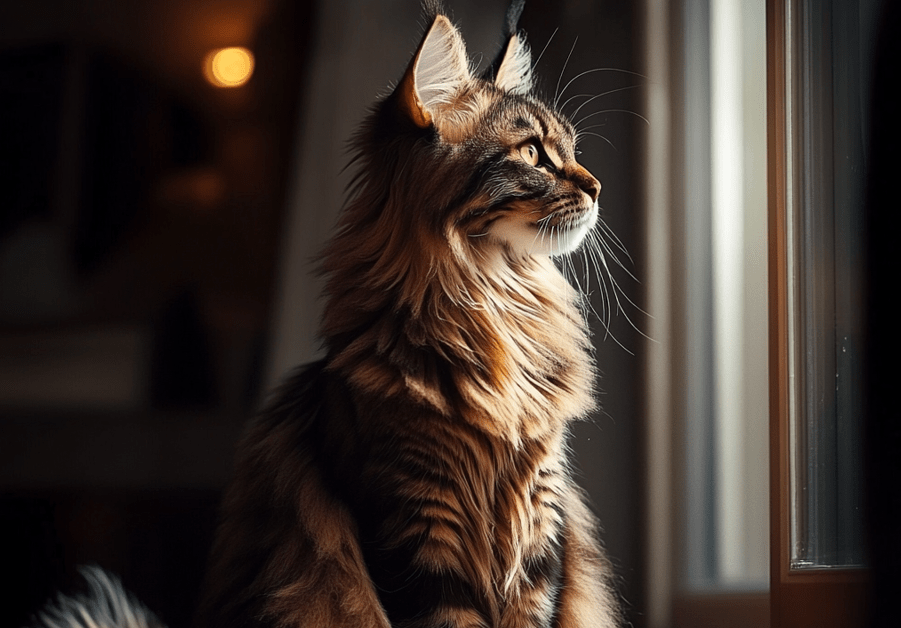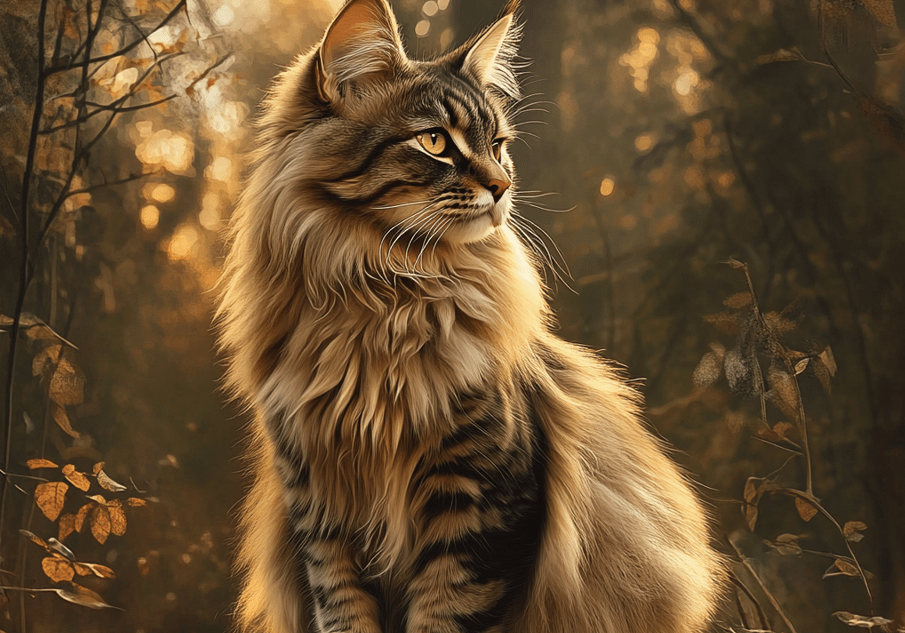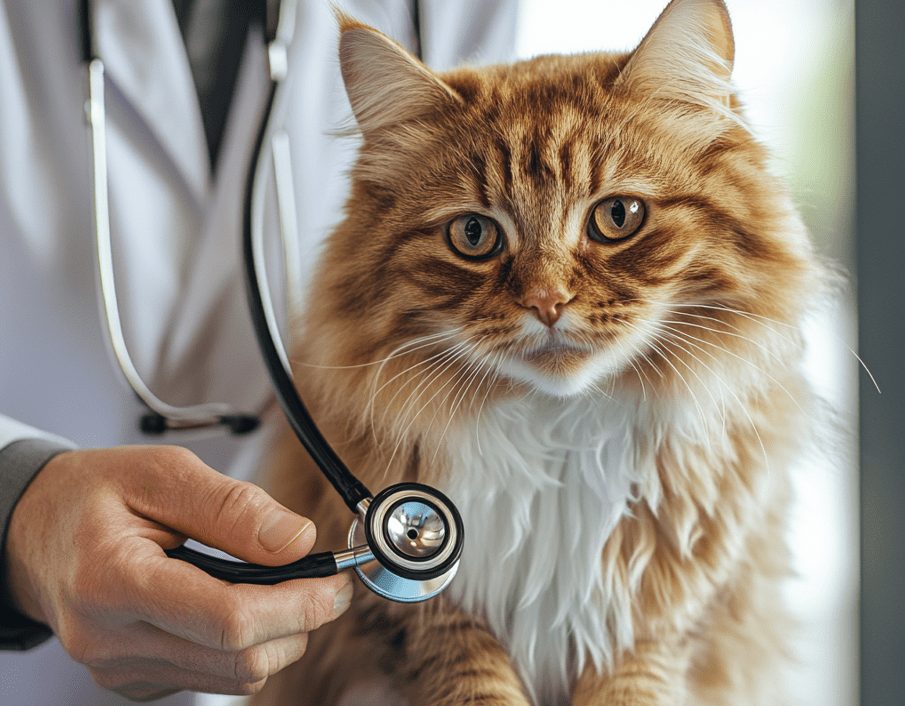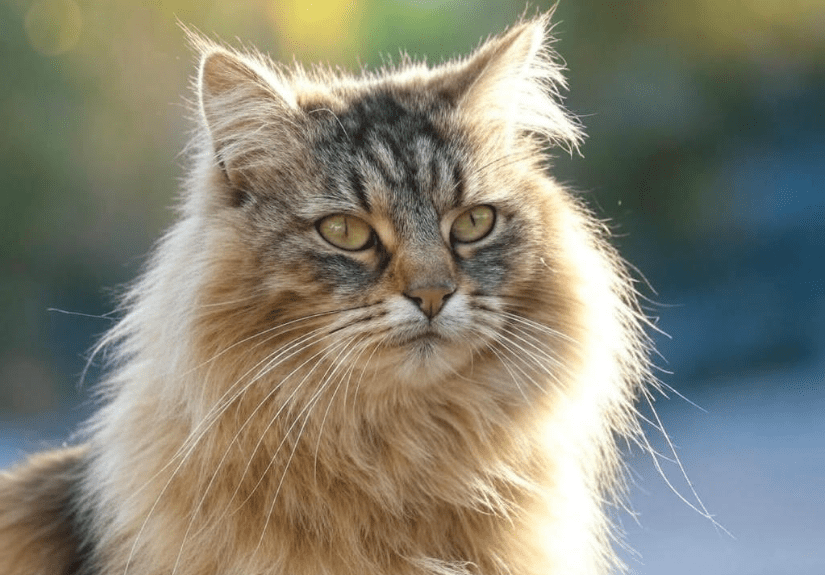
Maine Coons are known for their majestic size, friendly personalities, and lush coats, but their hearty appetites can sometimes lead to Maine Coon overeating, a concern for many owners. If your Maine Coon seems to devour their food too quickly or begs for more, you might wonder how to manage their eating habits to keep them healthy. Overeating can lead to obesity and related health issues, especially in this large breed. In this comprehensive guide, we’ll explore why Maine Coons overeat, the risks involved, and practical strategies to stop overeating while ensuring your cat thrives.
Understanding Maine Coon Eating Habits
Maine Coons, often called “gentle giants,” are one of the largest domestic cat breeds, with males weighing 13–18 pounds and females 8–12 pounds on average. Their size, high energy, and playful nature require a robust diet, but their love for food can tip into overeating if not managed properly. To address Maine Coon overeating, it’s essential to understand their natural eating behaviors and what drives excessive consumption.
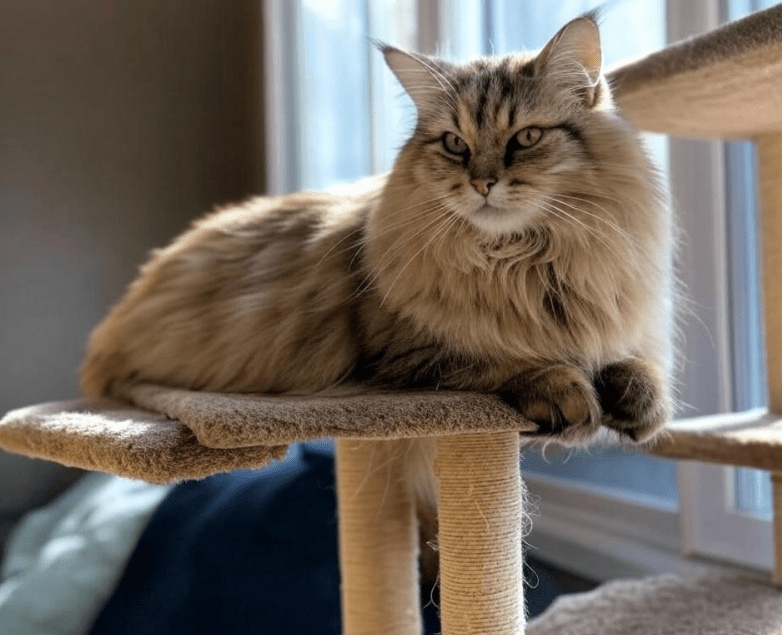
Why Do Maine Coons Overeat?
Several factors contribute to overeating in Maine Coons:
Breed Characteristics: Maine Coons have large frames and active metabolisms, which can make them seem perpetually hungry. Their size often leads owners to overestimate portion sizes.
Instinctual Behavior: Cats are opportunistic feeders by nature, and Maine Coons may eat beyond their needs if food is always available, mimicking their wild ancestors’ feast-or-famine instincts.
Boredom or Stress: Lack of mental or physical stimulation can lead to emotional eating. Maine Coons are intelligent and social, and boredom may drive them to the food bowl.
Medical Issues: Certain health conditions, like hyperthyroidism or diabetes, can increase appetite. Parasites or poor nutrient absorption may also cause excessive hunger.
Feeding Habits: Free-feeding (leaving food out all day) or inconsistent portion control can encourage overeating.
Risks of Overeating in Maine Coons
Overeating poses significant health risks for Maine Coons, including:
Obesity: Excess weight strains joints, increases diabetes risk, and shortens lifespan. Maine Coons are prone to weight gain due to their large size.
Joint Issues: Extra weight exacerbates conditions like hip dysplasia or arthritis, common in this breed.
Heart Disease: Obesity can contribute to hypertrophic cardiomyopathy (HCM), a genetic concern for Maine Coons.
Digestive Problems: Overeating may lead to vomiting, diarrhea, or gastrointestinal discomfort.
Reduced Quality of Life: Overweight Maine Coons may become less active, impacting their playful, social nature.
Signs Your Maine Coon Is Overeating
To tackle Maine Coon overeating, first identify whether your cat is consuming too much. Look for these signs:
Rapid Weight Gain: Check your cat’s body condition score (BCS). A healthy Maine Coon should have a visible waistline and a slight abdominal tuck. You should feel their ribs with slight pressure but not see them.
Constant Begging: If your cat meows for food shortly after eating or steals food, they may be overeating or not satisfied.
Large Portions Disappear Quickly: If your Maine Coon devours meals in seconds or eats more than the recommended amount for their weight, it’s a red flag.
Vomiting After Meals: Eating too much or too fast can cause regurgitation.
Lethargy: Overeating can lead to obesity, reducing energy levels and playfulness.
If you notice these signs, consult a veterinarian to rule out medical causes and develop a plan to manage your Maine Coon’s eating habits.
Why Maine Coons Are Prone to Overeating
Maine Coons have unique traits that make them more susceptible to overeating than other breeds:
Large Appetite: Their size and active lifestyle require more calories, but owners may misjudge portions, leading to excess intake.
Food Motivation: Maine Coons are often food-driven, eagerly responding to treats or meals, which can make them prone to overindulgence.
Social Nature: They may beg for food during family meals or when owners are in the kitchen, leveraging their charm to score extra bites.
Slow Metabolism in Adults: As Maine Coons mature (around 3–5 years), their metabolism may slow, but their appetite remains strong, increasing the risk of weight gain.
How to Stop Your Maine Coon from Overeating
Preventing Maine Coon overeating requires a combination of proper feeding practices, environmental enrichment, and health monitoring. Here are actionable strategies to help your cat maintain a healthy weight and eating habits.
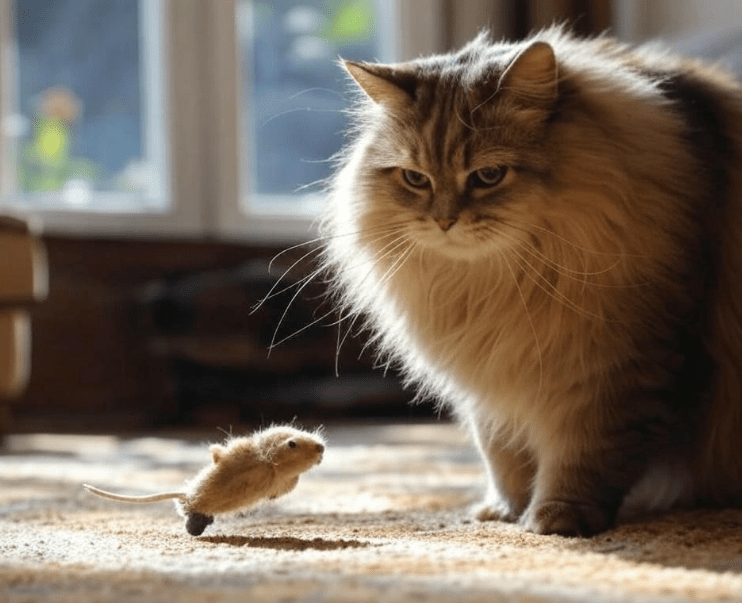
1. Establish a Consistent Feeding Schedule
Switch to Scheduled Meals: Instead of free-feeding, offer 2–3 meals per day at set times. This regulates appetite and prevents grazing.
Measure Portions: Use a kitchen scale or measuring cup to provide the exact amount recommended by your vet or the food manufacturer, based on your cat’s ideal weight.
Avoid Overfeeding Treats: Limit treats to 10% of daily calories. Use low-calorie options or break treats into smaller pieces.
2. Choose the Right Food
High-Quality, High-Protein Diet: Maine Coons thrive on protein-rich, low-carb wet or dry food formulated for large breeds. Look for foods with named meat sources (e.g., chicken, turkey) as the first ingredient.
Weight Management Formulas: If your Maine Coon is overweight, consider a vet-recommended weight control diet with reduced calories but high fiber to promote satiety.
Avoid Human Food: Table scraps are often high in fat and calories, contributing to overeating and obesity.
3. Use Feeding Tools to Slow Eating
Maine Coons often eat quickly, which can lead to overeating before they feel full. Try these tools:
Puzzle Feeders: These interactive feeders make your cat work for food, slowing consumption and providing mental stimulation.
Slow-Feeder Bowls: Bowls with ridges or obstacles prevent gulping, giving your cat’s brain time to register fullness (about 20 minutes).
Portion-Control Dispensers: Automatic feeders dispense precise amounts at set times, ideal for multi-cat households or busy owners.
4. Increase Physical and Mental Stimulation
A bored or understimulated Maine Coon may turn to food for entertainment. Keep them engaged with:
Daily Playtime: Spend 15–30 minutes daily using feather wands, laser pointers, or balls to encourage exercise. Maine Coons love chasing and pouncing.
Enrichment Toys: Provide puzzle toys, treat-dispensing balls, or cat trees to stimulate their intelligence and curiosity.
Environmental Enrichment: Rotate toys, add scratching posts, or create climbing spaces to keep your Maine Coon active.
5. Monitor and Manage Weight
Regular Weigh-Ins: Weigh your Maine Coon monthly using a pet or baby scale. Track changes and consult your vet if weight increases.
Body Condition Scoring: Learn to assess your cat’s BCS to ensure they stay within a healthy range (4–5 on a 9-point scale).
Vet Checkups: Schedule annual exams to monitor for obesity-related issues or medical conditions affecting appetite.
6. Address Medical Issues Promptly
If your Maine Coon’s overeating persists despite dietary and environmental changes, a health issue may be the cause. Consult your vet if you notice:
-
Increased appetite with weight loss (possible hyperthyroidism or diabetes).
-
Excessive hunger despite adequate feeding (possible parasites or malabsorption).
-
Behavioral changes like aggression or lethargy (possible stress or pain).
Your vet may recommend blood tests, fecal exams, or imaging to diagnose underlying conditions.
7. Manage Multi-Cat Households
In homes with multiple cats, competition for food can lead to overeating. To prevent this:
Feed Separately: Feed each cat in a different room or use microchip-activated feeders to ensure your Maine Coon only eats their portion.
Monitor Access: Prevent your Maine Coon from stealing food from other pets’ bowls.
Tailor Diets: If other cats have different dietary needs, ensure your Maine Coon’s food is appropriate for their weight and activity level.
8. Reduce Stress and Emotional Eating
Stress can drive Maine Coons to overeat as a coping mechanism. Minimize stress by:
Maintaining Routine: Keep feeding, play, and litter box cleaning consistent.
Providing Safe Spaces: Offer high perches or quiet hiding spots where your cat can retreat.
Using Calming Aids: Pheromone diffusers (e.g., Feliway) or calming treats may reduce anxiety-driven eating.
When to Seek Veterinary Help
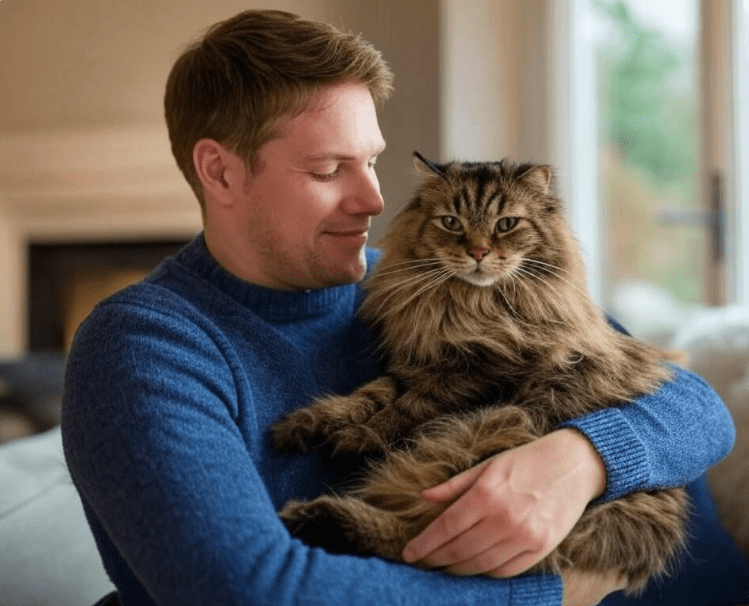
If your Maine Coon continues to overeat or gains weight despite your efforts, consult a veterinarian. Seek immediate help if you notice:
-
Sudden appetite changes (increased or decreased).
-
Vomiting, diarrhea, or lethargy after meals.
-
Difficulty breathing, limping, or reduced mobility (possible obesity-related complications).
-
Signs of diabetes (increased thirst, frequent urination) or hyperthyroidism (weight loss despite overeating).
Your vet may recommend a tailored weight loss plan, diagnostic tests, or medications to address underlying issues.
Long-Term Strategies for Preventing Overeating
To maintain healthy eating habits in your Maine Coon over time:
Stay Consistent: Stick to feeding schedules, portion control, and play routines.
Educate Family Members: Ensure everyone in the household follows the same feeding rules to avoid overfeeding.
Monitor Life Stages: Adjust food portions as your Maine Coon ages, especially after spaying/neutering or entering seniority (7+ years).
Celebrate Progress: Reward small milestones, like weight loss or reduced begging, with playtime or affection instead of treats.
Fun Facts About Maine Coon Eating Habits
Big Appetites, Big Personalities: Maine Coons often “talk” to their owners about food, using chirps and trills to beg for meals.
Water Lovers: Many Maine Coons are fascinated by water and may drink more than other breeds, which can support healthy digestion.
Slow Growers: Maine Coons take 3–5 years to reach full size, requiring careful portion control during growth to prevent obesity.
Conclusion
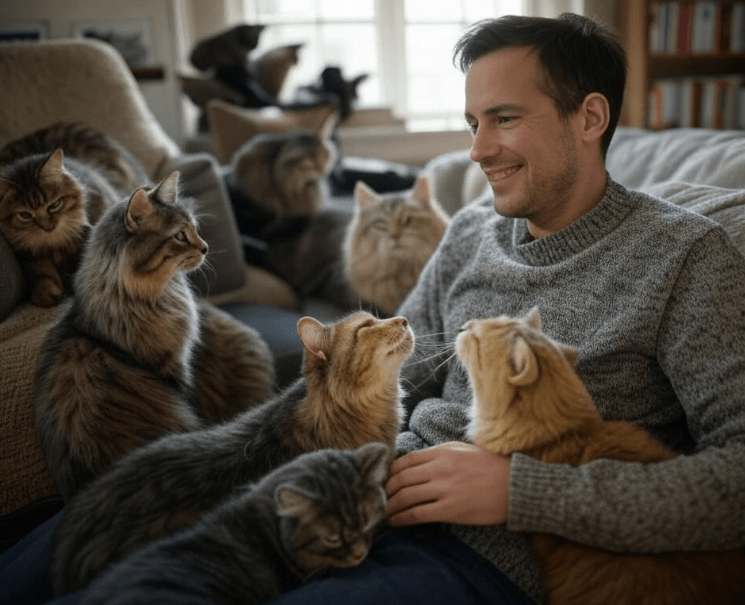
Maine Coon overeating is a common issue, but with the right strategies, you can help your gentle giant maintain a healthy weight and lifestyle. By establishing a consistent feeding schedule, choosing high-quality food, using slow-feeding tools, and providing ample physical and mental stimulation, you can curb overeating and its associated risks. Regular vet checkups and weight monitoring are crucial, especially given the breed’s predisposition to obesity and heart disease. With patience and care, your Maine Coon can enjoy a balanced diet, active playtime, and a long, healthy life.
If you’re concerned about your Maine Coon’s eating habits, start with small changes and consult your veterinarian for personalized advice. Your efforts will ensure your Maine Coon remains the vibrant, loving companion they’re known to be.

